Wander, Wonder, Write: Part Six
Guam to Korea
About This Series
Wander, Wonder, Write is a travelogue-style memoir told in real time, capturing the moments—both ridiculous and sublime—that unfold during a father-daughter journey across east Asia. Blending vivid storytelling, quiet reflection, and a generous dose of humor, the series explores what it means to be present, to parent with curiosity, and to trade control for connection. It’s part love letter, part field journal, and part reminder that life’s best memories are often found in the unexpected.
This is part six of the series. You can start at the beginning here:
Know another home schooler or world traveller who would enjoy reading this? Please share it with them!
The Jenny Calls
We took off from California at 8:00pm on Friday. The flight took 7.5 hours exactly. When we touched down in Guam, it was midnight on Sunday.
Let me say that again.
We took off Friday. We landed Sunday.
What happened to Saturday?
Gone. Erased from the calendar like a poorly thought-out email draft.
That’s the magic trick of crossing the International Date Line: time folds in on itself, and suddenly you’re 17 hours ahead of where you began—tired, confused, and feeling like you’ve been robbed by some kind of smug time thief.
Guam welcomed us with thick, soupy air and a pitch-black night sky that felt more like the bottom of an aquarium than an island paradise. We waited over an hour for our bags, which arrived wrapped and palletized like military cargo—because, well, they were. Forklift delivery, cargo netting, the whole nine yards. Our suitcases looked like ammunition crates being shipped into a combat zone. And honestly? That felt about right.
Then came the next challenge: transportation.
There was no taxi service. Not after midnight on a Sunday. Not on base. Not anywhere. Apparently, the taxi industry here goes to bed early, and even if someone were willing to pick us up, they’d need special access to get on base—which most drivers don’t have or don’t care to figure out.
Meanwhile, several other passengers decided to take fate into their own hands and walked. The roads are largely unmarked, and there are no street lights. I looked at my daughter, considered my options, then imagined trying to explain to my spouse how I lost our daughter on a tropical island for a few hours in the middle of the night… then decided to keep looking for a taxi. I called the hotel and asked if they could help us find a ride. The lady at the front desk said she’d call “a friend” who said he would be there in 10 minutes. Having travelled extensively in foreign countries in Asia, the local networks fueled by military bases are hard to explain to people who have never been there. Hotel staff have friends and family who drive taxis. They work together. Taxi drivers recommend the hotels. Hotels recommend the taxi drivers. Everyone wins.
Everyone… except sometimes the tourists, which, in this case was me.
30 minutes later a car finally pulled up—an older model mini van with bright blue LED headlights and the soft thump of bass seeping from within. The driver emerged, a short man with a buzz cut, a Bluetooth earpiece, and a shifty gaze. I said good evening and he grunted in response.
This was going to be fun.
I explained where we needed to go—a hotel on base, just a mile away. He didn’t speak English. And he had absolutely no idea where we were going.
We showed him the hotel name. He nodded, confidently. He mumbled a few things, punched in some directions on his phone. Then drove in the exact opposite direction.
His GPS was set to a language I didn’t recognize—possibly Chamorro, possibly Martian—and while mine showed that our hotel was literally one mile away, his sent us tearing across the island like we were making a drug drop. I tried explaining the direction, pointing at the map, waving my phone. He nodded again. Turned. Then missed the turn. Again.
That’s when Jenny called.
Her name lit up his screen like a warning flare.
He answered. Immediately the car was filled with a woman’s voice yelling in some dialect I couldn’t identify. It didn’t matter. Anger, as it turns out, is a universal language. A few seconds in, our driver said exactly three words: “yeah, yeah, yeah” and then hung up without comment. Immediately, he called another number. As soon as the man answered, our driver began yelling in very broken English. His accent was so difficult to understand that it felt like when my kids would play Mad Libs, and the only way to figure out what was being said was to repeat the syllables slowly, over and over, until the words began to make sense.
“Poké Spa! Blah BM Duba-ew! They witting! They witting nah! Yeah! Poke’s Bah! You nah it? Go na!”
He hung up without saying another word, then continued driving as if nothing had happened… continuing on in the wrong direction. He looked back at me, as if expecting affirmation. I stared blankly. “No,” I said. “No Poke’s Bah. Hotel. Please turn around.”
We continued on. He made more wrong turns. Missed several exits. Tried to make a U-turn but didn’t seem to know how to reverse. Instead, we continued forward until a natural curve in the road gave him the excuse to loop back. I know this trick. The classic “lost driver” play to extend the fare. I’ve seen it before in too many countries to count. This guy was an artist.
Jenny called again.
Immediately upon answering the phone, without hesitation, she started yelling. Her words came through his phone’s speaker loud and clear.
Our driver said exactly three words again: This time, “no, no, no!” Then he hung up and dialed another number even faster.
“Pokez Bah! Blah BM Duba-ew! They MAD! She MAD! You go nah! Go!”
Not even a minute later, Jenny graced us with her presence again. Her volume had somehow increased. Her voice—a steady stream of high-pitched, rage-soaked syllables—filled the entire car like a demonic ringtone. Our driver muttered “bah!” in frustration and terminated the call with all the finality of a man who had just declared emotional war.
He redialed the other number. Again.
“Pokez Bah! She mad! Blah BM Duba-ew! Go nah! GO!”
My daughter and I looked at each other with a mixture of curiosity and disbelief. I needed to understand what he was saying to even have a clue of what I was experiencing. I repeated the words he said again and again in my head, trying to understand what he meant. Eventually, I put two and two together. Here is my translation of what he had been saying:
“Porkey’s Bar. Black BMW. They are waiting. They are waiting now. Yeah. Porkey’s Bar. Go now!”
This was the soundtrack of our journey. I desperately wanted to know the backstory, to understand this strange triangulation of communication. Who was this Jenny, and why was she so angry with life? Was Jenny our driver’s wife? Why else would our driver have her name programmed into his phone? Does Jenny get drunk so often and require a taxi to get home that this man has her number saved with her name? She apparently drives a black BMW. What does she do for a living, and why is she yelling at this man at 2am on a Sunday morning?
Twenty-five minutes later and two more Jenny calls later, we arrived at the hotel. The other passengers from our flight who walked had beaten us there.
Our driver parked, flustered.
“I need sixty dollah! They call me, they say on base. I not know base. You not worth my time. Sixty.”
I laughed. I couldn’t help it. We had driven for 25 minutes, on base, for what GPS said should have taken 6 minutes.
I offered $20 via credit card. He recoiled like I’d insulted his mother.
“No card. Cash. I lose money!”
I showed him my wallet: $15 in wrinkled bills. The rest of my cash was tucked away in a hidden pocket with my passport. He scowled and countered with, “Fifty dollah. Card. You not worth my time!”
We haggled in the dark while my daughter watched, uncertain of what was happening, jet lagged and exhausted. I, on the other hand, could not stop giggling. Every time I countered, his protestations became more exotic.
They call me, tell me come right away! On base. I not know base. I have bad hart! You not worth my time! $60 good deal! You take it! You American. You rich! I know! Sixty dollah cheap!
I calmly nodded and empathized with him, not wanting to insult the man. He clearly has a rough life, what with Jenny calling him nonstop. Was this a nightly occasion, I wondered. Is this why he has a bad heart?
He dropped to $40. I offered $30. We met at $35, and I handed him a $5 bill for his trouble. In parting, he left us with more words, yelled at us in his exasperated broken English we had come to adore in our short time together.
Next time, don’t call me!
There won’t be next time! I won’t be here! Bah!
He turned to walk away. His phone rang again.
It was Jenny.
He hit the button, letting the phone swing in his hands as he stomped back to his vehicle. The high-pitched fury of Jenny’s voice exploded from the cracked screen, echoing across the parking lot like a battle siren. I laughed uncontrollably as my daughter stared, still wondering what to make of the entire escapade.
Welcome to Guam, I said shaking my head.
How NOT to spend a day in paradise
We dragged our bags inside the hotel lobby. It was 2:30 in the morning. Ten minutes later we stepped into our rented cottage, dropped our bags, and immediately collapsed into bed.
We woke a few hours later, surprisingly functional. With maybe four hours of sleep on the plane and four more in bed, we’d logged a full night by travel standards. I opened the door to find a world that was—eerily—still.
No birds.
No breeze.
Just thick, unmoving heat. The kind of heat that makes your shirt stick to your back the second you step outside. The kind of heat that feels personal.
The houses here are all concrete. Low, squat structures painted in muted yellow, faded by sun and streaked with mildew. Our little cottage sat on a high point of the island, and from both the front and the back we could see the ocean. Not just a slice of it—a full, wide sweep of endless blue in both directions. Surrounded by water while standing on land. It’s a strange, almost unsettling thing, to look east and west and see nothing but horizon.
There is precious little by way of restaurants on base, and the few that aren’t part of the food court are closed on weekends. So, I explained that we would take this opportunity to eat at the DFAC—the military Dining Facility—on base. My daughter asked, “Is it any good?”
“It’s good enough for us troops,” I said. “So it’s good enough for you.”
Turns out, it was actually better. A full buffet breakfast, made-to-order omelets, and enough options to satisfy both of us for $16 total. Honestly, the best deal we’ve had all trip.
With our bellies full and our bodies rested, we considered how we wanted to spend our day on this tropical island. We had to be on the flight line for the last leg of our journey at midnight, which meant we had around 16 hours to kill. The plan was to rent a car and drive around the island for the day. Simple, right?
Wrong.
First came the sun. We set off walking towards the only rental car business on base, following our trusty GPS directions.
Only a few minutes into our walk, the heat had become a living thing. My daughter, trying to rally, wanted to buy a lighter shirt, so we walked to the base exchange (a military Sears-like department store). She picked out an adorable cut-off button-up that tied at the waist—a popstar-meets-farmer vibe that totally worked on her. But the walk nearly did her in. Between the jet lag, the crushing humidity, and a pulled muscle from the previous day’s overzealous workout, she was completely wiped.
30 minutes later, we arrived at the base rental office. Closed. Under construction.
We walked another 20 minutes back home, where I jumped online and found out via a random Facebook comment that the rental office had temporarily moved… back to the base exchange. Where we had just been…
I called. No cars available.
I called every agency at the airport—Hertz, Dollar, Alamo, Thrifty, even Sixt. No dice. Kayak confirmed the horror: no cars available on the entire island.
Apparently, a Navy ship was in town. The smallest Navy ship carries around 250 sailors. The largest carries 5,000+. That explained everything.
We had to make a decision.
A taxi to downtown would cost us at least $75—each way—plus whatever emotional trauma we might experience from other Jenny’s of the world calling to yell at cab drivers. Getting downtown would also leave us wandering through an American territory filled with strip malls in unbearable heat—not exactly what either of us had in mind for the day. My daughter would melt. I would lose my mind. And we’d still have to kill several hours before our midnight roll call for the next flight.
The hotel receptionist looked at me and said, with a smile:
“You could always just rent the house for another night. It’s only $150.”
With no restaurants on base, no rental cars available, nothing within easy walking distance and blazing humid heat that threatened hallucinations, the prospect of returning to our air conditioned cottage to relax and recover made this an easy decision.
So, back we went to our little two-bedroom cottage. Back into glorious AC. Cold water. Peace. My daughter collapsed on the couch, smiling. I sipped iced tea and stared out at the palm trees melting in the afternoon sun.
Roll call is at midnight. Until then, we rest.
Consensus at this point: We are not coming to Guam again.
The Cliff’s Edge
We spent the afternoon relaxing and rejuvenating in peaceful silence. I wrote, she read. We both dozed. By late afternoon, the oppressive heat that had blanketed the island all day began to ease. The sun, still bold but no longer blistering, cast long golden streaks across the grass outside our cottage. It was around 5:00pm when we laced up our shoes and set out for an adventure we’d both agreed upon earlier in the day—one of those loosely planned hikes that begins with a map, a hunch, and a mutual sense of curiosity.
From our perch on the northeastern edge of Guam, we could tell—both from satellite imagery and from simply standing outside—that the ocean was not far. Less than half a mile, if the maps were to be believed. Given our elevation, we figured there must be cliffs nearby. Maybe even a sweeping view of the sea. Maybe something unforgettable. The kind of thing you find only when you go looking for it without expecting anything at all.
We started across the golf course, making our way towards the edge of the jungle. Eventually, we found ourselves on what could only generously be called a trail—narrow, half-formed, and quickly swallowed by thick green. We slipped through the outer edges of the jungle and quickly found ourselves surrounded in an entirely new landscape.
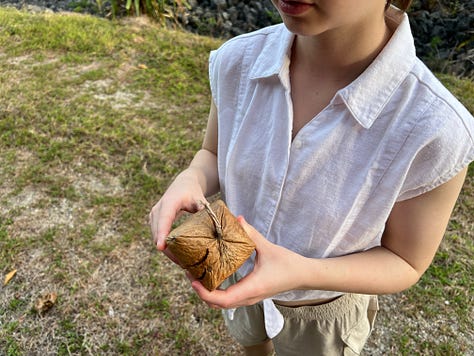
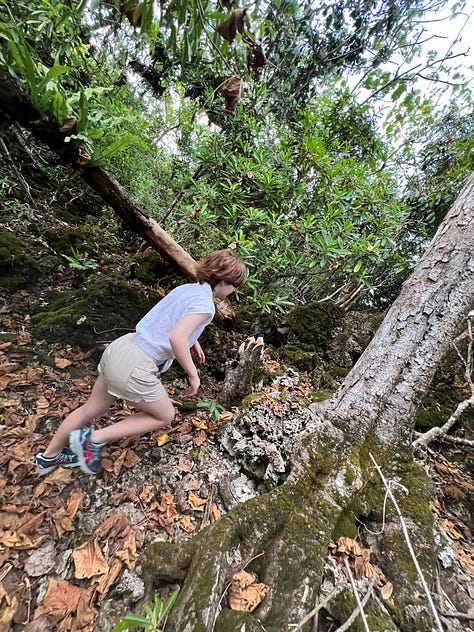
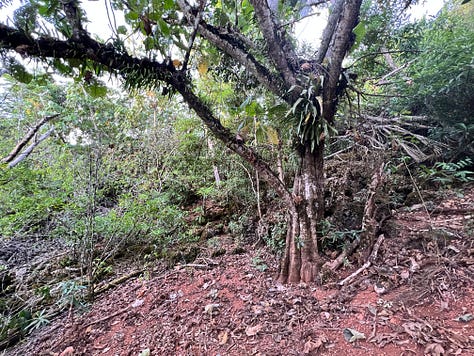
The air was still. Dead still. No birds. No wind. No hum of insects. The silence here was uncanny, as if the island itself had paused to listen. We had felt it since we arrived, this strange hush—an island pressing gently against your ears like a held breath.
As we descended into the jungle, the landscape changed. Colorful spiders spun webs between trees, their long spiky legs painted in surreal neon patterns. Strange, boxy coconuts lay scattered beneath palms, while low-lying pineapples ripened on their thick stalks, defying every grocery store stereotype we’d ever internalized. The ground became rough and jagged—volcanic rock, sharp and unforgiving, a reminder that this place was born of fire.
Soon, the trail disappeared altogether.
Branches closed in around us. Vines snagged our clothes. The earth grew uneven, sloped. We weren’t following a trail anymore—we were forging one. Our pace slowed, not from fatigue, but from awe. Everything was alive with detail: moss clinging to the volcanic flow, lichen on bark, roots tangled like veins beneath our feet. The terrain rose and fell, winding us deeper into a place where no guideposts remained. And then, quite suddenly, we stepped out of the green and found ourselves at the edge of the world.
The land dropped off in a dramatic plunge—hundreds of feet below us, the ocean beat itself against the rocky coastline. The water was the kind of blue you don’t quite believe until you see it in person: deep, crystalline, electric. It pulsed with energy as it smashed into the base of the cliffs, white spray exploding like fireworks with every impact. The cliffside stretched out in both directions, tall and steep, like the bowed spine of some sleeping prehistoric creature. A strong breeze blew up from the sea, washing over our sweaty faces like a blessing. After nearly an hour of bushwhacking through the thick jungle, the cool air was a holy relief.
We wandered the cliffs for a while, wordlessly. It didn’t feel right to speak. Instead, we breathed it in—the salt in the air, the wind in our hair, the hush of this high place. My daughter stood near the edge, arms slightly outstretched for balance, staring out at the endless Pacific like she belonged to it.
There was no obvious way down to the water. Just vertical rock faces and dense growth below. But further down the ridge, we spotted a series of rocky outcroppings that formed something like a trail—a steep, precarious, but possible descent. We looked at each other, eyebrows raised. No words exchanged. Just a silent agreement.
Let’s do it.
I led the way, staying below her, always ready to catch her should she lose footing. The red soil was loose, dry, and slick—each step demanded focus, each handhold a prayer. We kept three points of contact at all times. Our hands and legs quickly became caked in dust, painting us the same crimson hue as the cliff. Wind whipped our faces, tugged at our shirts. The air was electric.
Slowly, steadily, we made our way down.
We reached a wide ledge partway down, and from there the view was even more spectacular. We were close enough to hear the roar of the ocean, to smell it in our lungs. It was loud here—not with noise, but with presence. Everything around us felt immense. Timeless.
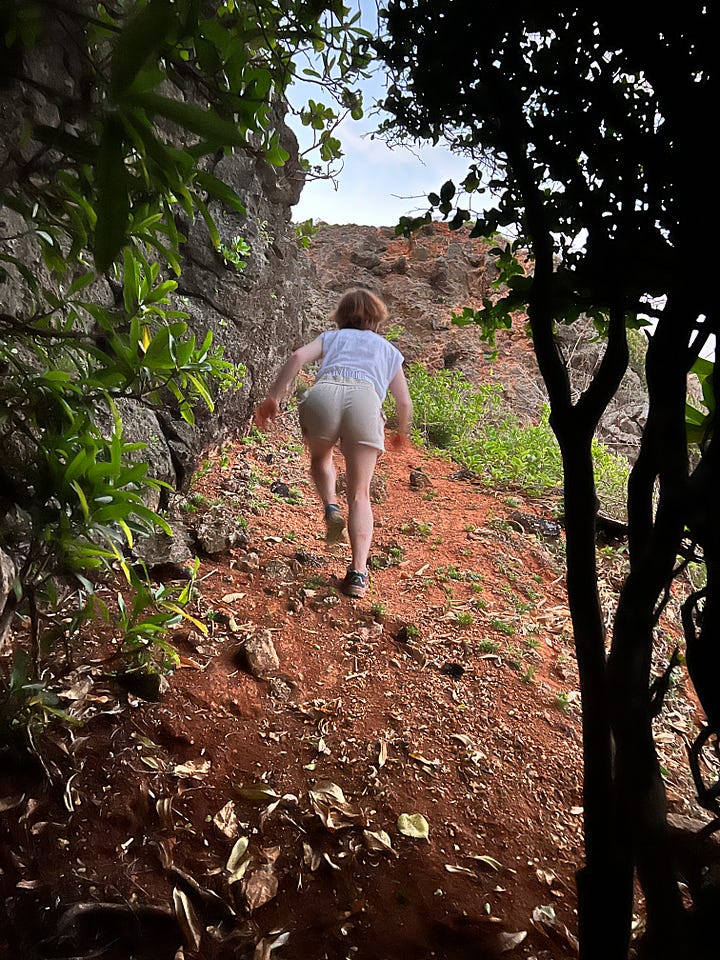
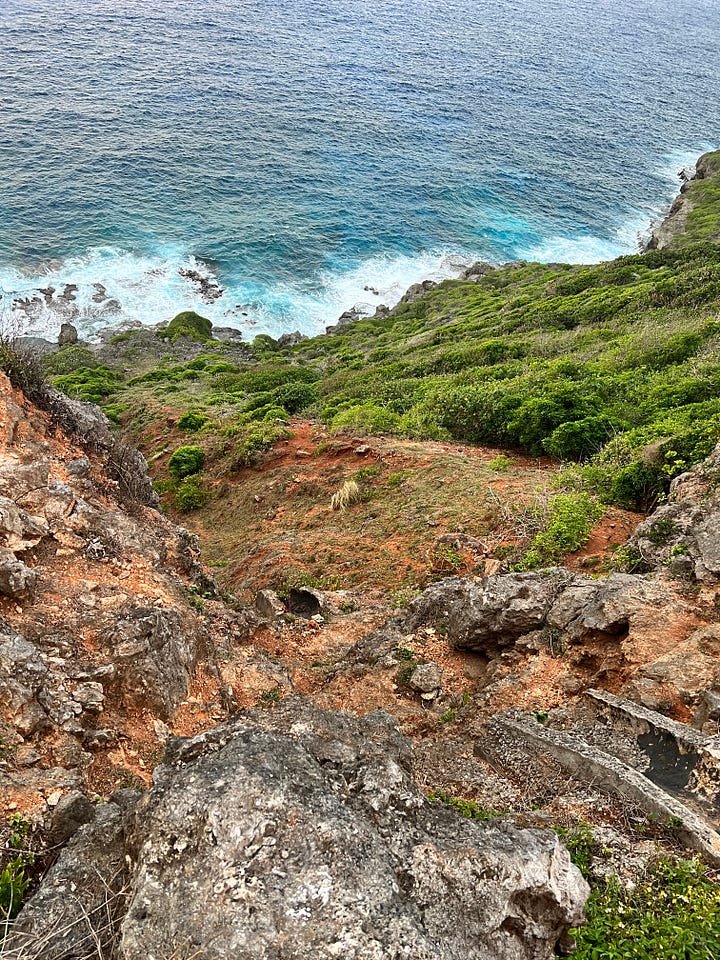
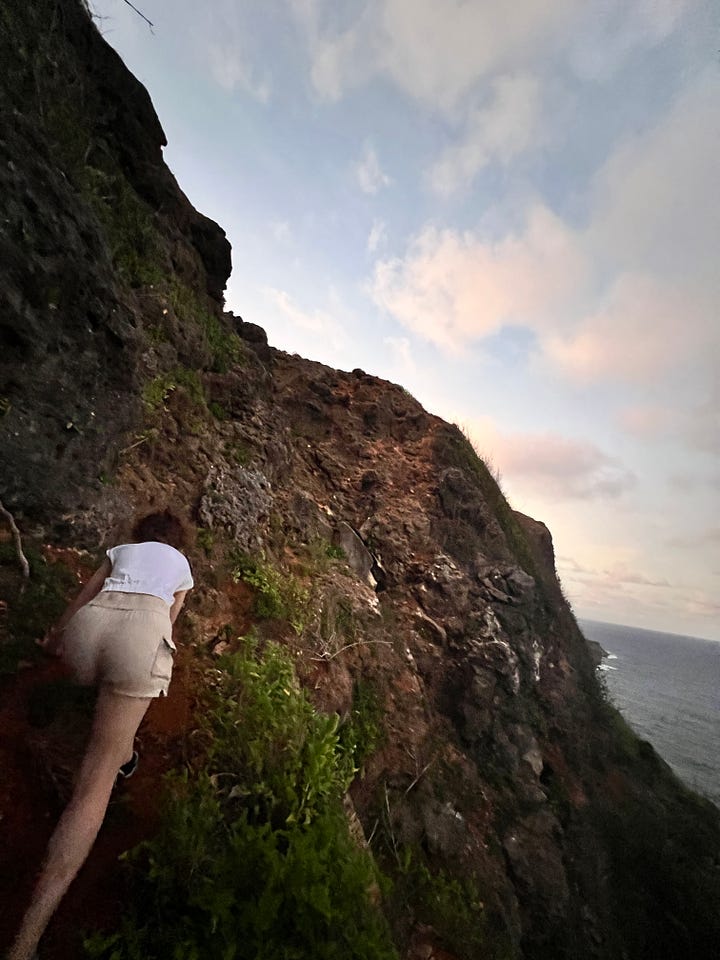
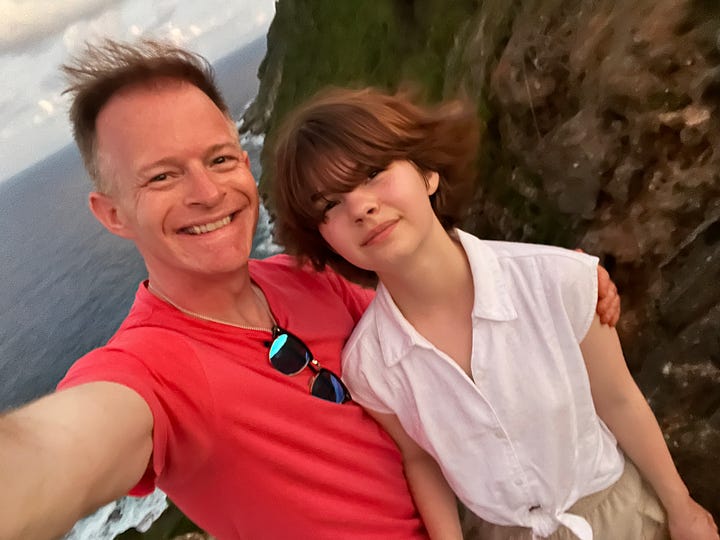
My daughter’s voice carried on the wind, full of joy and wonder. She was alive with energy, with curiosity. Her enthusiasm radiated outward, blending with the golden light of sunset until it felt like the entire cliff was aglow with her spirit.
This was what I’d hoped for when I said yes to this trip.
Not just K-pop cafes or bougie airport lounges or instagram-worthy food photos—but this. A shared moment of adventure. A memory carved into a cliff at the edge of the world. Impromptu bouldering with my daughter at sunset on a remote island in the Pacific. This—this—is wealth. Not the kind measured in money or status or career milestones, but the kind you measure in breaths taken, sights seen, and hearts opened.
As the sun dipped lower, we knew we had to climb back up. The return was slower, steeper, harder. We scrambled on all fours, red dirt flaking from our palms. But we took it one foothold at a time.
Halfway up, my daughter paused. She turned to examine something in the rocks—a small, delicate nest tucked into a crevice. The wind blew strands of hair across her face, and she looked at me with a smile, beckoning me to come see.
For a moment, time stopped.
Is this what she’ll look like the day she introduces me to her first love? Is this what she’ll look like when she says, “I’m getting married, Dad,” and I pretend not to cry? There was something in her expression—a mix of pride and wonder and innocence—that I wanted to memorize forever.
This amazing human being. This vibrant soul. A fragment of my DNA, somehow becoming entirely her own person. Blossoming right before my eyes.
Tomorrow, we fly further west to our intended destination: Seoul, South Korea.
Tonight, we rest, hearts full, skin sun-kissed, and memories etched in red dust and golden light.
This is parenting. This is life. This is everything.




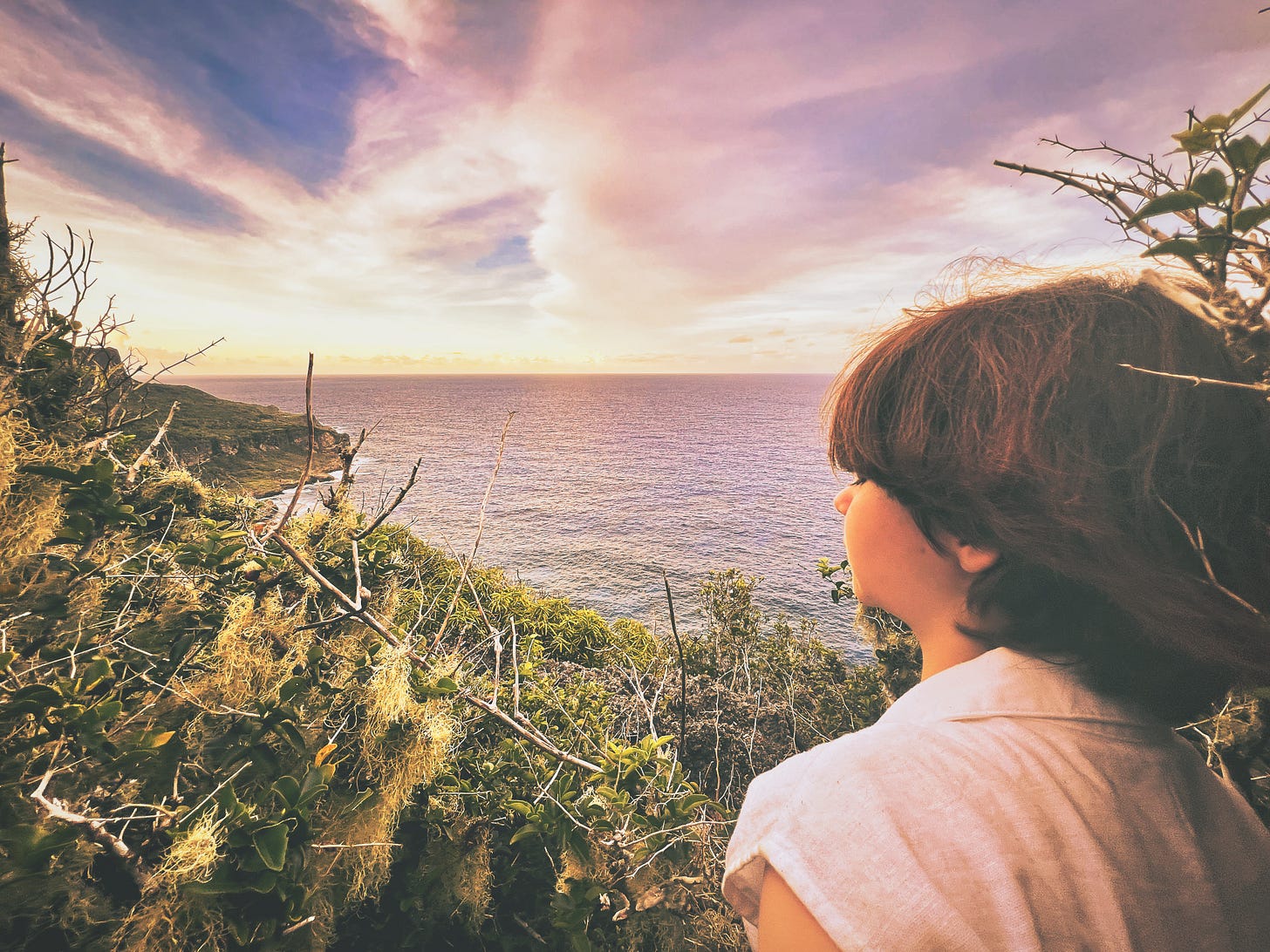
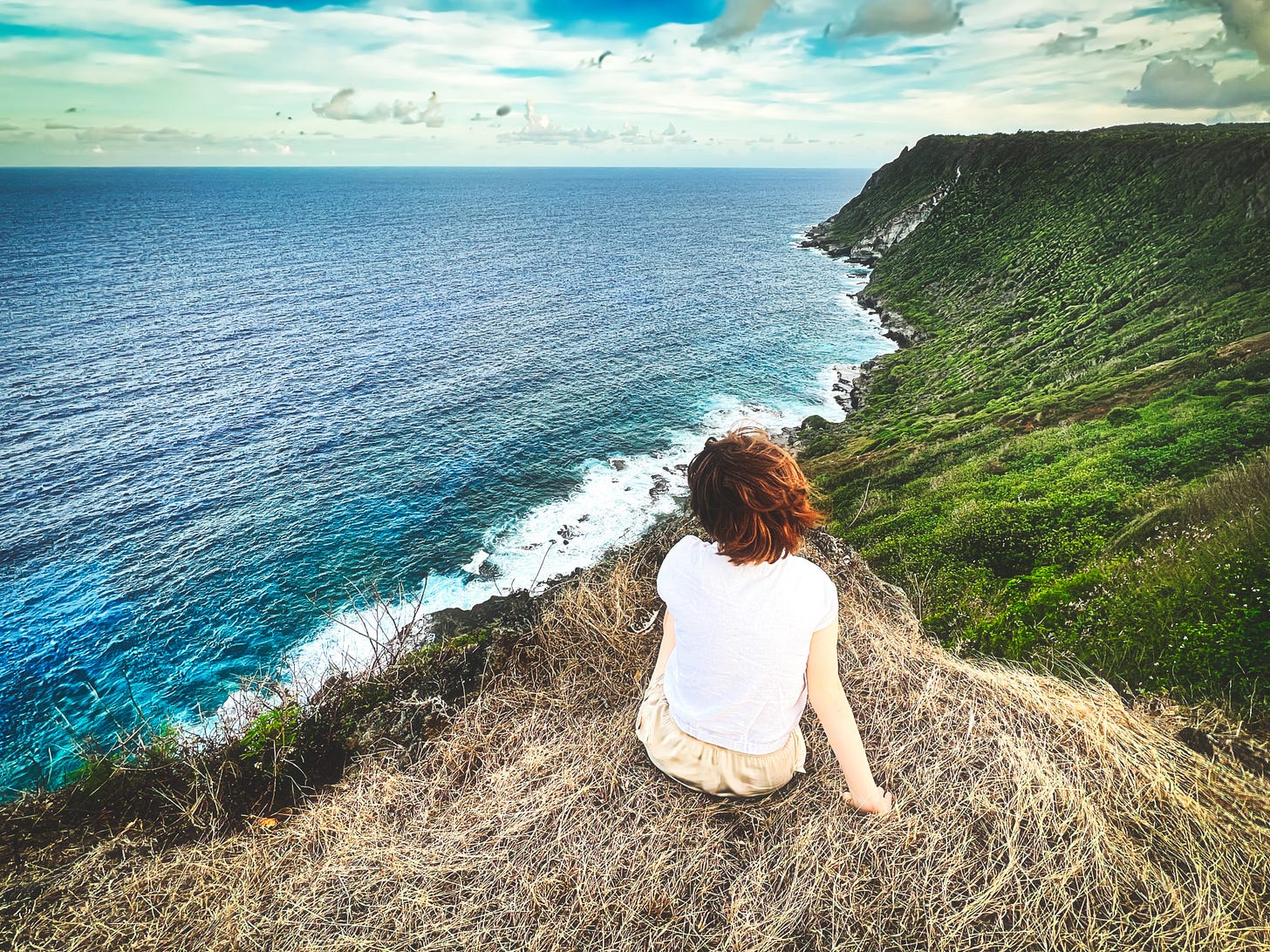
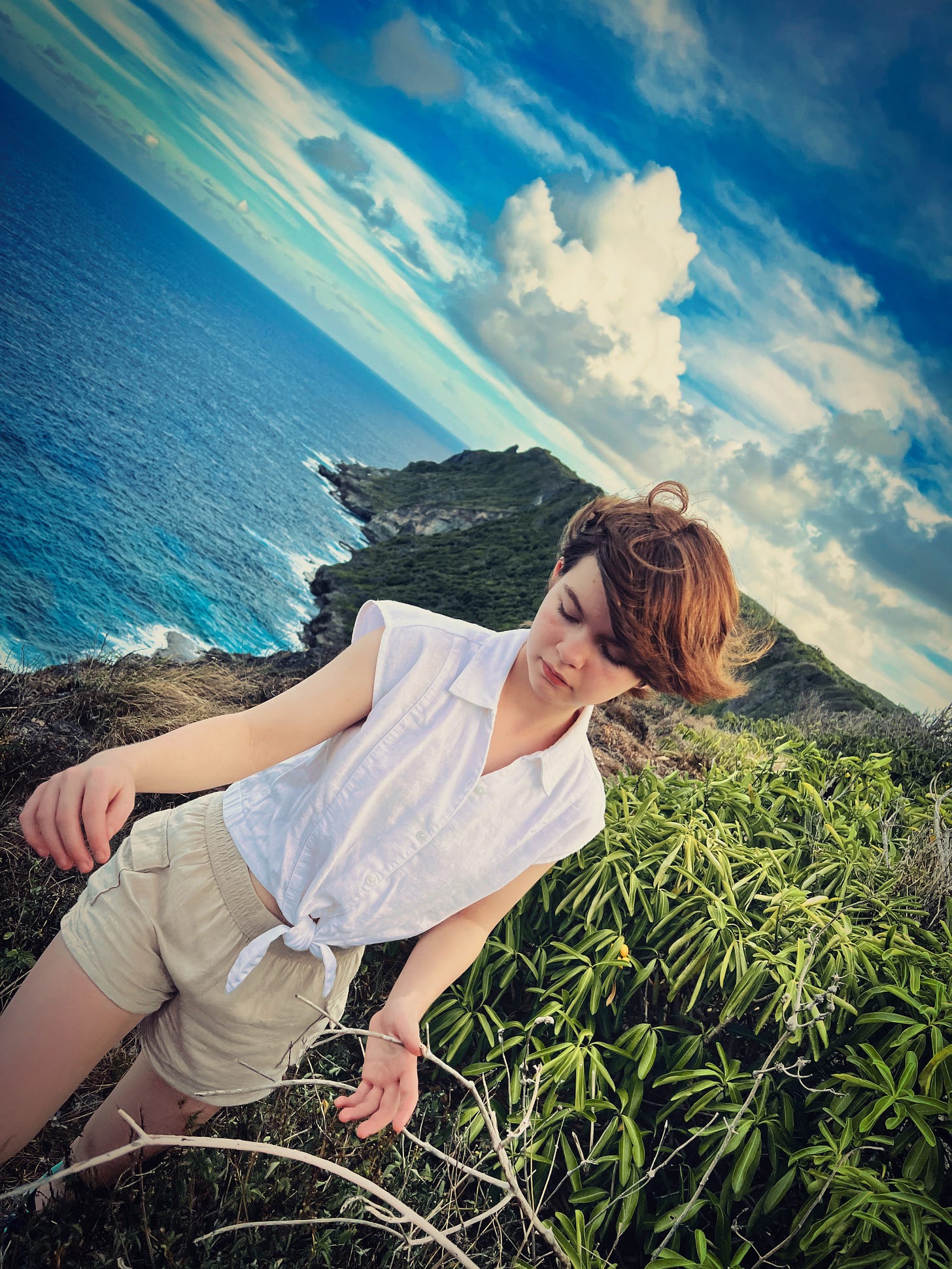
A colleague’s son just got Andersen as his first duty station. Proud USAF parents are flying commercial to see him at some point but she needs to see this.
What a beautiful picture of Rebecca.